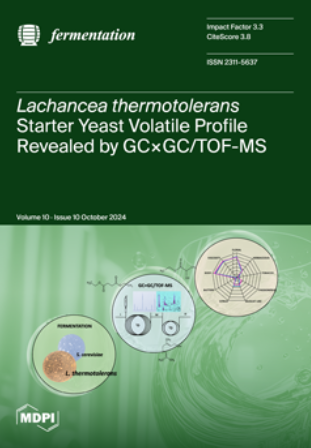The Effect of Dietary Fermented Grape Pomace Supplementation on In Vitro Total Gas and Methane Production, Digestibility, and Rumen Fermentation
IF 3.3
3区 农林科学
Q2 BIOTECHNOLOGY & APPLIED MICROBIOLOGY
引用次数: 0
Abstract
The aim of this study comprises the effect of fermented grape pomace (FGP) in experimental total mixed rations (TMR) at different rates (0, 7.5%, 15%, and 22.5%) on the in vitro cumulative gas production (6th, 12th, 18th and 24th hours), methane production, ruminal fermentation values, pH and ammonia-nitrogen and straight and branched short-chain fatty acids (SCFA and BCFA) concentration. The method of in vitro total gas production was carried out in glass syringes. Ruminal in vitro methane production linearly decreased by adding up to 22.5% FGP in experimental TMR (p < 0.05). The molarities of acetic, propionic, butyric, and valeric acids in the in vitro fermentation fluid linearly decreased with the addition of FGP to TMR (p < 0.05). FGP up to 22.5% in experimental TMRs decreased the molarity of iso-valeric acid and iso-butyric acid from BSCFAs (p < 0.05). As a result, it was concluded that the use of FGP, containing a low level of total condensed tannins (TCTs), up to 22.5% in the experimental TMR based on dry matter (DM) did not adversely affect the in vitro ruminal fermentation value and had an anti-methanogenic effect. In addition, some SCFA (acetic, propionic, butyric, and valeric acids) molarities and iso-acid BSCFA (iso-butyric and iso-valeric acid) did not change up to 15% rate of FGP in the ration. Still, these values decreased by using a 22% rate of FGP. The dose-dependent effect of FGP on ruminal iso-acids has been associated with the ability of TCTs to inhibit ruminal protein degradation partially.日粮添加发酵葡萄渣对体外总气体和甲烷生成、消化率和瘤胃发酵的影响
本研究的目的包括在不同比例(0、7.5%、15%和22.5%)的实验总混合日粮(TMR)中发酵葡萄渣(FGP)对体外累积产气量(第6、12、18和24小时)、甲烷产量、瘤胃发酵值、pH和氨氮以及直链和支链短链脂肪酸(SCFA和BCFA)浓度的影响。在玻璃注射器中进行了体外总气体产生的方法。在实验TMR中,添加22.5%的FGP后,瘤胃体外甲烷产量线性下降(p<0.05),体外发酵液中的戊酸随着向TMR中添加FGP而线性下降(p<0.05)。实验TMRs中高达22.5%的FGP降低了BSCFA中异戊酸和异丁酸的摩尔浓度(p<0.05),在基于干物质(DM)的实验TMR中高达22.5%不会对体外瘤胃发酵值产生不利影响,并且具有抗产甲烷作用。此外,一些SCFA(乙酸、丙酸、丁酸和戊酸)摩尔比和异酸BSCFA(异丁酸和异戊酸)在日粮中FGP的变化率高达15%时没有变化。尽管如此,通过使用22%的FGP,这些值还是降低了。FGP对瘤胃氨基酸的剂量依赖性作用与TCTs部分抑制瘤胃蛋白质降解的能力有关。
本文章由计算机程序翻译,如有差异,请以英文原文为准。
求助全文
约1分钟内获得全文
求助全文
来源期刊

Fermentation-Basel
BIOTECHNOLOGY & APPLIED MICROBIOLOGY-
CiteScore
3.80
自引率
18.90%
发文量
594
审稿时长
7 weeks
期刊介绍:
Fermentation-Basel is an international open access journal published by MDPI, focusing on fermentation-related research, including new and emerging products, processes and technologies, such as biopharmaceuticals and biotech drugs. The journal enjoys a good reputation in the academic community and provides a high-impact forum for researchers in the field of bioengineering and applied microbiology.
 求助内容:
求助内容: 应助结果提醒方式:
应助结果提醒方式:


